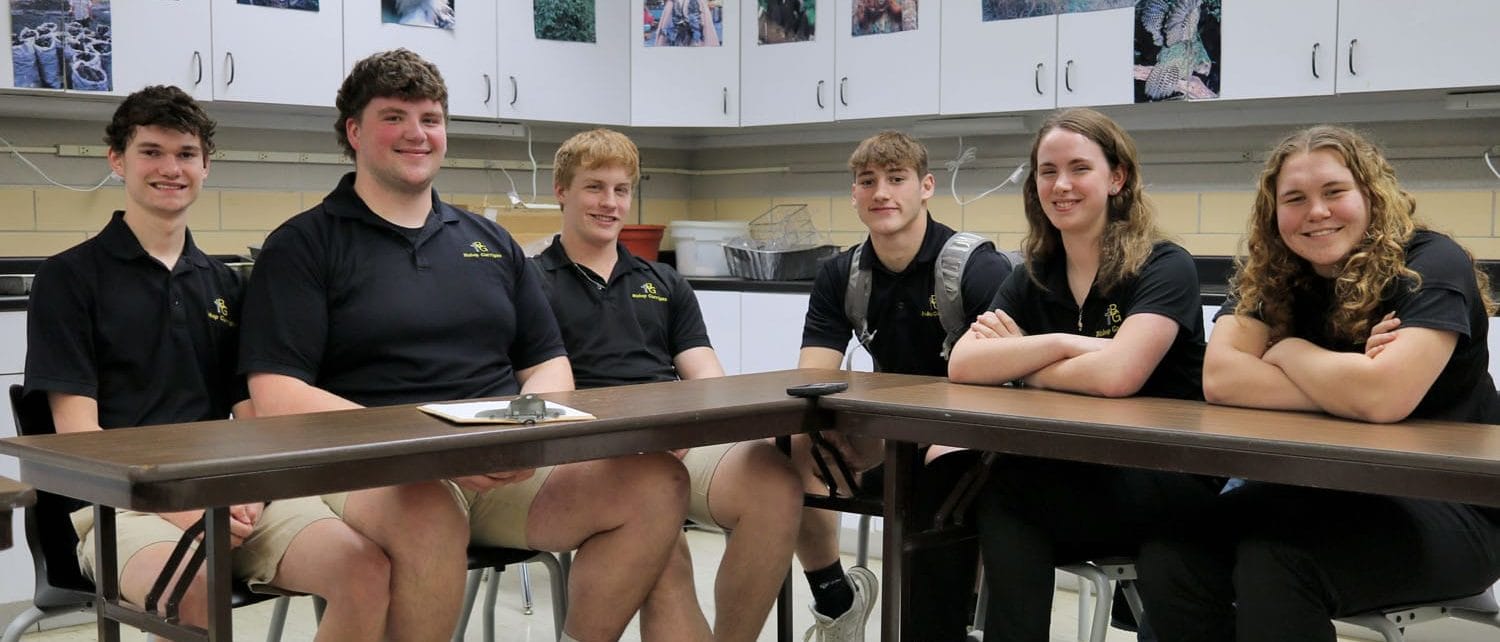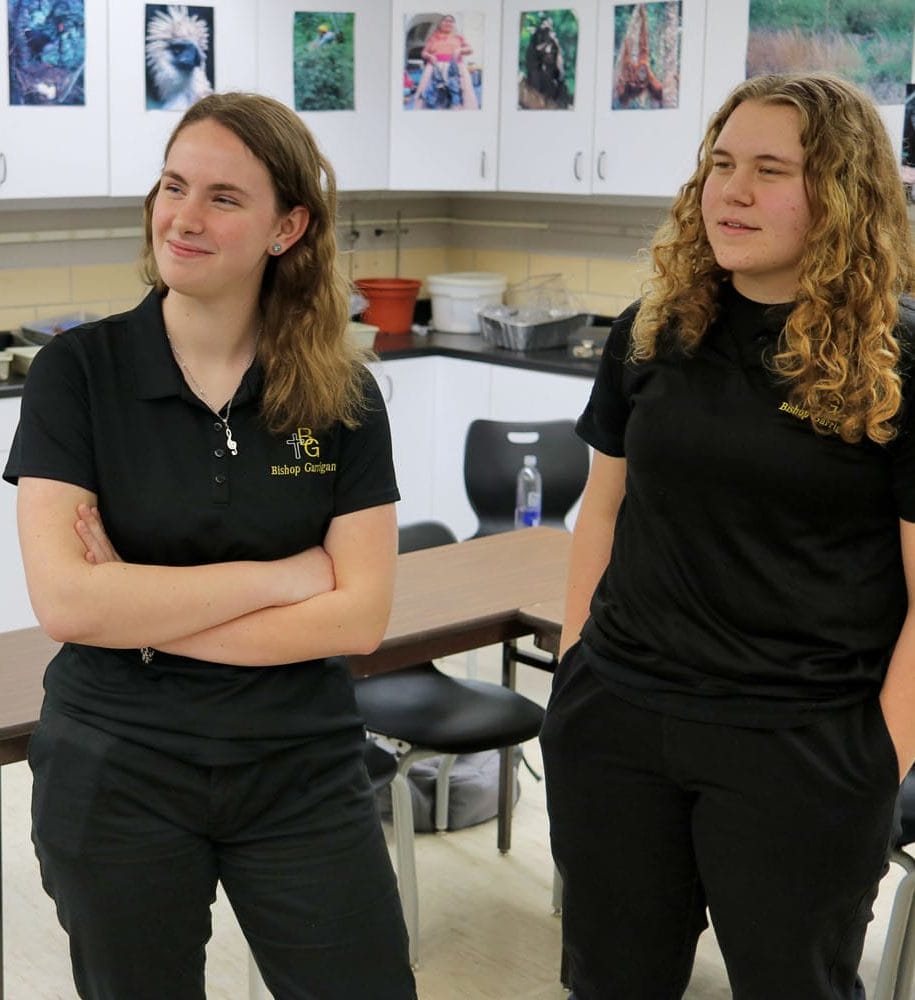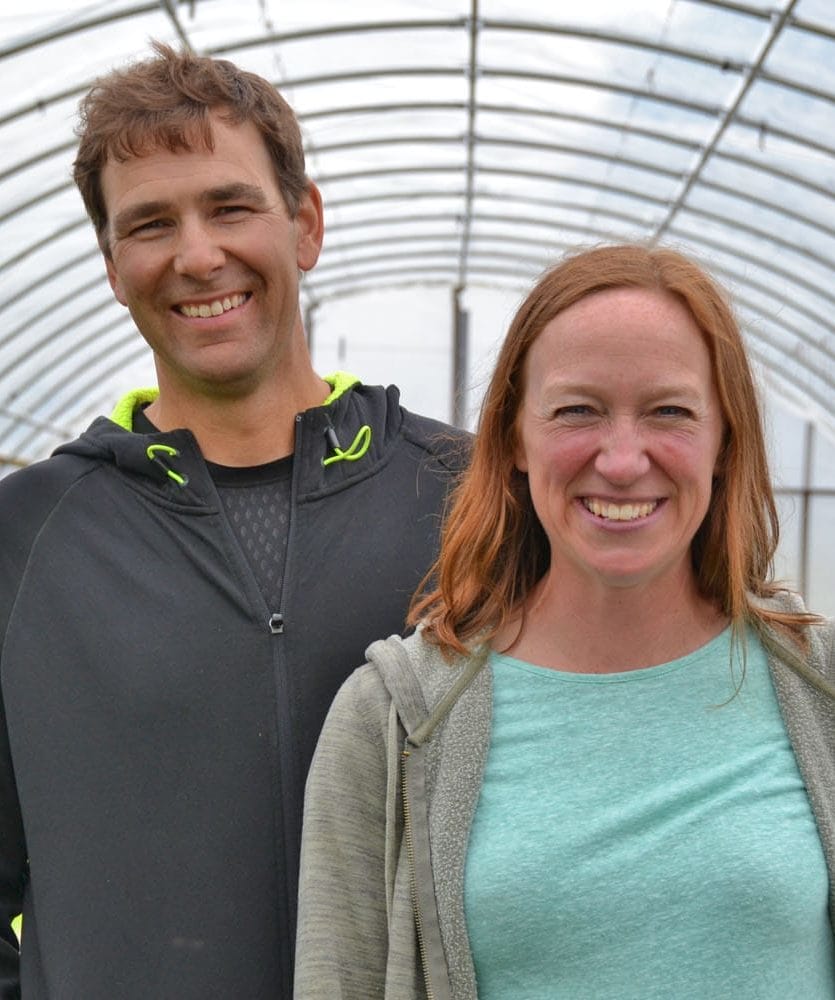Picking Up Rocks
For one group of young future farmers, care for land and community is one of many lessons learned from their farm upbringing
On a rainy day in March at Bishop Garrigan Catholic School in Algona, Iowa, Beany Bode dismisses his biology class and selects a few students who farm with their family to stay behind and talk with me about their perspectives on farming. As PFI’s beginning farmer engagement coordinator, I’m here to learn more about what young people today think about farming, and what their farming interests and concerns are.
The students, while taking their seats, tease one another to normalize the strangeness of my presence. As they grow comfortable, they share stories, lessons learned and answer questions about their farming goals.
Hanna Merron, a junior, reflects for a minute before saying, “My dad started planting cover crops a few years ago. That way, we aren’t working the ground and only taking things [nutrients] out.”
Hanna farms with her dad, drives by their fields every day on her way to school and observes them as they change daily. “The first year, he didn’t know when to terminate the cover crop. It was choking out the beans, but he didn’t want to get rid of it too soon, so it was definitely a learning process,” Hanna explains.
Alaina Bormann, also a junior, reflects on the benefits of being born into a farming family.
“We definitely have an advantage growing up like we are,” Alaina says. “To have parents, grandparents and great-grandparents farming before us, so we can start learning from the age of five.”
Learning is the topic of the hour, not just because we are in a classroom, but because every on-farm experience the kids recount is a teaching moment meant to be filed away and recalled in their future endeavors, whether they decide to farm or not.
“We call that shotgun learning,” Beany says. “You ride shotgun in the truck with your dad and pick things up.”
To his students, Beany is known as Mr. Bode. But to many PFI members, he’s known as a fellow member who owns and runs Bode’s Moonlight Gardens with his partner, Joanne Roepke Bode, near Algona. Together with their children, they grow a range of vegetables and pumpkins that they sell at the Kossuth County Farmers Market, and through a fall pumpkin, gourd and squash U-pick on their farm.
Beany also teaches science full-time at Bishop Garrigan, and is clearly beloved and admired by his students. They tell me about all the extra work Beany puts in, how he goes on nature walks before class to gather specimens and how he goes the extra mile by planning hands-on activities and field trips so everyone can learn in their own way.
“You almost learn more from doing it wrong than you learn from doing it right,” says Logan Nemmers, a loquacious and quotable senior. “You have to take risks in farming. If you don’t take risks, you’re not going to get anywhere.”
The students have a lot to say about taking risks on the farm. Issues like trying to go organic, using new equipment and testing different species of cover crops are on their minds every season. “Farming is trial-and-error,” Logan continues, “and it’s scary.”
The other students nod in agreement – but are also quick to point out how rewarding their time on the farm has been, despite the risks. They tell me about the positive impact they make on their community and beam with pride while sharing their contributions.
“Everyone needs a farmer,” Logan says, smiling. “Without us farmers, there wouldn’t be food on anyone’s plates.”
Ethan Marso, a sophomore balancing on the two back legs of his chair, takes pride in the way farmers in his area support one another: “Everybody helps everybody,” he says. “You help your neighbor out.”
He also tells a story about a man who, while helping on his farm, removed the cap of the manure pump while it was running. Through giggles, he says the man was hit with firehose force, throwing him back 20 feet and soaking him from head to toe in manure.
The other students laugh at this tale, and I am suddenly reminded of their youth. These youngsters are so full of wisdom and confidence that it’s easy to forget they are still children who can revel with such youthful glee at stories of manure mishaps. Maybe their mix of maturity and modesty stems from growing up on a farm.
As if reading my mind, a student says, “Picking up rocks puts people in their place” – a tedious chore, they tell me, I should avoid at all costs. Yearly, the kids walk their family fields and pick up stones the size of baseballs, or bigger, so they don’t interrupt field work or damage equipment later. (I’m told if there is a small stone next to the baseball-sized one, you must grab that one, too.)
Hanna says when the fields get prepped for planting, you can see the rocks that were missed. She recalls driving in the field with her dad. “He noticed a rock left behind,” she says. “I guess I will get that one next year.”
As they reflect on what they’ve learned from their time on the farm, the students also share their plans and worries for the future.
Some will pursue farming, some will work in the world of agriculture and others are still unsure. “It’s nice to know that your family has been doing it for generations,” Ethan says of his family’s farming history. “Keeping it going is something that you need to see. But you don’t want to see the farm go to crap during your time.”
In addition to feeling pressure to sustain their family’s farm legacies, land prices are a stressor for more than one student.
“Land ain’t cheap,” Ethan says. “You have to buy more land, grow on it so you can pay it off and then make money off that land. The idea is to expand so that when I pass the farm to the next generation, they have the land they need to keep the farm going.” Reflecting on the subject, Logan adds, “All the big corporations can afford it and we can’t.”
The discussion shifts to the fluctuating price for corn, soybeans and beef.
“It’s concerning how the prices of beef keep going down and changing drastically,” says Caden Roethler, a senior and cattle enthusiast. “I don’t know how good it’s going to be by the time I get to the point when I own cattle and will be in business.”

Students Nick Laubenthal, Logan Nemmers, Ethan Marso, Caden Roethler, Alaina Bormann and Hannah Merron in their science classroom at Bishop Garrigan in Algona.
Beany, who has largely been listening up until now, jumps in to ask the group a question. “Do you think you will get the farm? Most of you have siblings in the family and you will be in competition with them because your farm likely can’t provide for all of you.”
A lot of heads nod, but no one opts to respond – possibly because it’s hard to know the answer. Or, it’s hard to say aloud.
Despite the stresses and the uncertainties, many of these students feel called to farm.
“Vocation is a good word for farming,” Caden says, “because when you vocate yourself to something, I think that means you give something up and gain something from that sacrifice.”
I wonder, but don’t ask, what he sees as the elements of that exchange. Is the stress and work the sacrifice and the harvest what’s being gained? Or, is the harvest the sacrifice and the gain the sustenance of a community?
Nick Laubenthal, a senior who’s been listening to the discussion, sees the exchange differently – as one of care for land and community.
“Farming is a community and we have to keep in mind we are responsible for Iowa,” Nick says. “We need to keep the soil healthy so our community can keep farming.”
The theme of responsibility to Iowa, their community and the land runs throughout our conversation. What’s clear is that these students – the next generation of farmers – are invested in keeping their farms and communities resilient and healthy.
I’m heartened to think that these young people are the ones who will steer the conversation on farming when it’s their turn at the helm. They are the kind of kids who pick up rocks rather than throw them.
The Future for Young Farmers
Getting started farming is hard no matter one’s background. For many young farmers, the primary obstacles to starting a farm are access to land, housing and water.
While those who grow up on farms, like the students featured in Rachel Burke’s story, may have a land access advantage, that’s not always guaranteed. According to Elston Tortuga, an Iowa organizer for the nonprofit National Young Farmers Coalition, young farmers are often unable to access funds to start and grow their operations.
“They also experience difficulty with healthcare access, and are impacted by the student loan debt crisis,” Elston says, adding that these issues disproportionately affect Black, Indigenous, Latino, LGBTQ+ and other farmers who have been historically marginalized.
But what of the issues that motivate young people to start farms? Citing findings from the coalition’s 2022 National Young Farmer Survey, Elston – who uses the pronoun they – says 83% of respondents identified conservation as a primary purpose of their operation.
“Young farmers recognize that farming is a public service and are motivated to solve social and environmental issues through their farming practices,” they say. “These farmers are increasingly aware of the ways that agriculture can contribute to solving the climate crisis by restoring carbon to the soil, reviving local food economies and so much more.”
Aware of the barriers young farmers face, PFI offers a range of programs, events and outreach designed to address these barriers. Learn more about our beginning farmer work at practicalfarmers.org/beginning-farmers.


